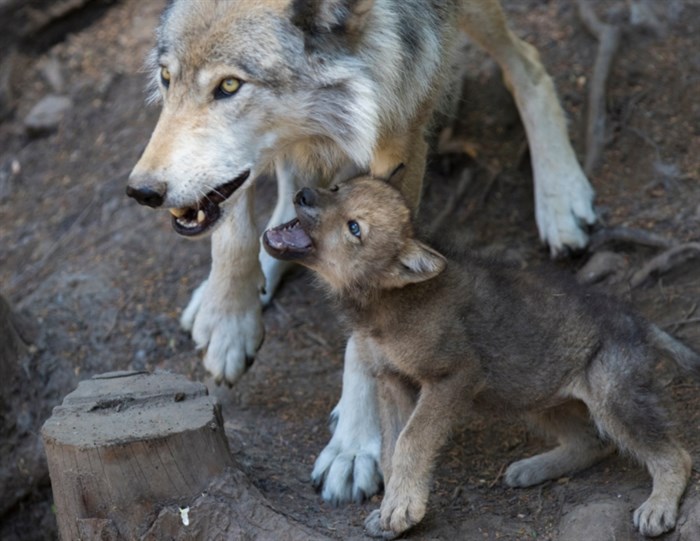
FILE PHOTO
Image Credit: B.C. SPCA
June 12, 2022 - 10:28 AM
Father's Day is around the corner and the B.C. SPCA is showcasing five animal dads that will feed, protect, teach and nurture their offspring.
"The animal world, just like the human world, has amazing dads," according to the SPCA. Father's Day is June 19.
Wolves
Wolf dads are committed to their offspring and are heavily involved in the day-to-day care of their litter, which averages about four to seven pups each spring, according to the SPCA.
The lead male and female in a wolf pack form lifelong bonds and are the only parents of the group.
For the first three weeks of their lives, wolf pups survive on their mother’s milk as dad protects the den. Then it is up to dad and the other adult wolves in the pack to feed the pups.
The pups will eat regurgitated meat that the male wolf and other adult wolves bring to the pups in their stomachs and when the pups lick the area around the adult’s mouth it triggers the meat to come up from their stomach into their mouths.
When dad isn’t feeding and protecting his pups, he is a teacher and mentor to them, along with an extended family of siblings, aunts and uncles, sharing his knowledge of hunting strategies and techniques, according to the SPCA.
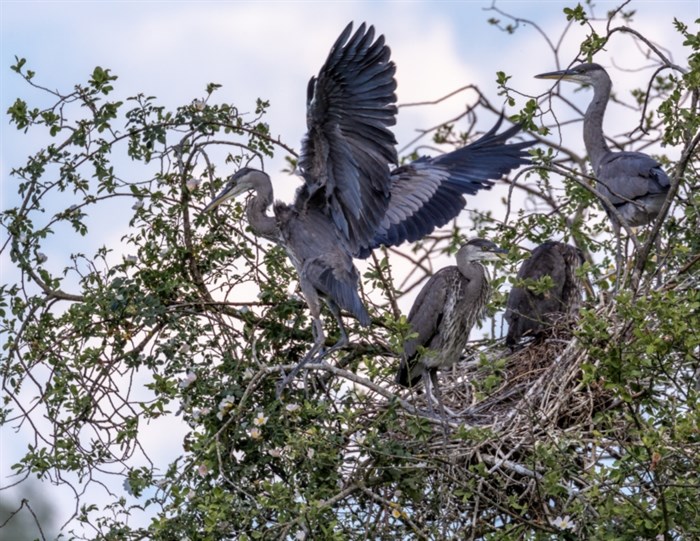
Blue heron
Image Credit: B.C. SPCA
Great blue herons
Great blue heron dads share all of the parenting duties equally with mom including incubating the eggs.
The father heron collects all of the nest materials and mom sets them up. When the eggs are laid, dad incubates them during the day and mom takes the night shift.
Parents also share the hunting duties – while one parent is sitting on the eggs, the other hunts. When the eggs hatch, they are constantly cared for by one of the parents for the first week or two and just like the incubating duties, they are split equally.
As the chicks get older, dad and mom will both leave the nest to search for food, still returning to care for the young. Around 10 weeks old, the young herons leave the nest and the parenting duties end, according to the B.C. SPCA.
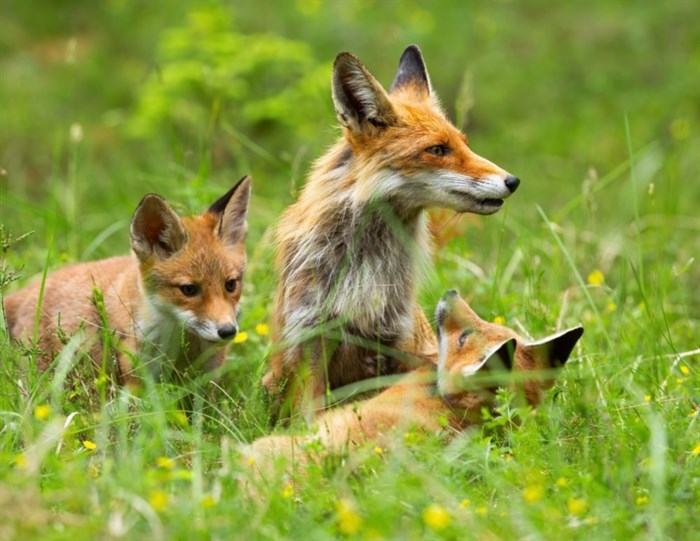
Foxes
Image Credit: B.C. SPCA
Foxes
Fox dads are known for their excitement and endless enthusiasm to play and roughhouse with their cubs. They don’t just shower their young with attention and affection, however, they are also an attentive mate. When mom can’t leave the den for a month because of her milk-dependent pups, dad brings her food every four to six hours, according to the SPCA.
When the fox cubs are fully weaned, their parents no longer feed them, but they will help the cubs find their own food. Fox dads go the extra mile to teach their cubs how to feed themselves; he will bury surplus food close to the den and disguise it with leaves and twigs teaching the cubs to sniff and forage.
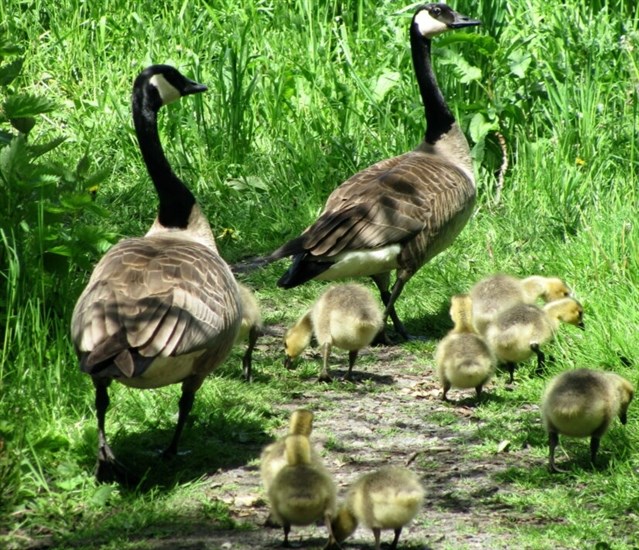
Canada geese
Image Credit: B.C. SPCA
Canada geese
Canada geese have strong family bonds. Once a goose (female) and gander (male) are paired they are bonded for life.
Canada geese dads are heavily involved with the caring and protection of their young. Both parents communicate with their goslings in the egg before they hatch and while the Canada goose mom incubates the eggs, dad distracts predators from finding the nest.
Once the goslings have hatched, they travel as a family everywhere with mom at the front and dad at the back. Both parents take responsibility for caring and protecting them, especially when they move from the nest to the brood-rearing area which may require the family to walk several kilometres in a few days. Geese share parenting duties with other families to help keep their large broods safe.
They are one of only a few birds that will accept orphans into their family and raise them as their own, according to the SPCA. When the goslings have grown their flight feathers, both parents teach them how to fly. The family will stay together for a year and the young geese will follow their parents during their first migration and then leave to form groups with other young geese.
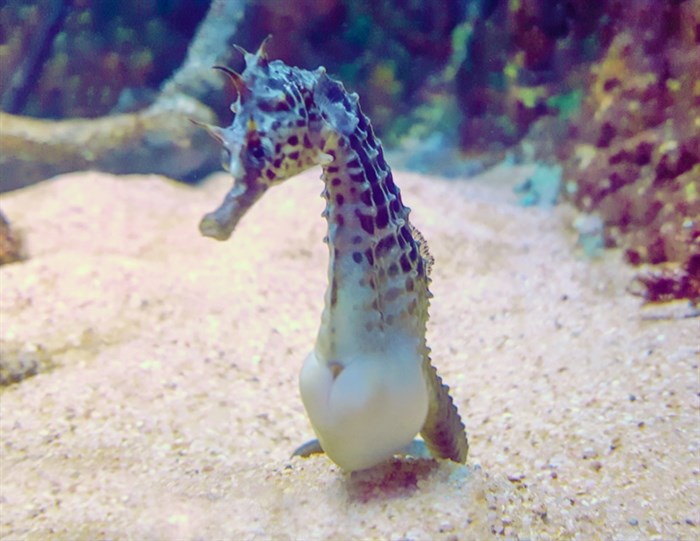
Seahorse
Image Credit: B.C. SPCA
Seahorses
When it comes to animal dads, the Seahorse is legendary. The Seahorse dad carries the embryos and gives birth. When the female has chosen a mate she will put her eggs in the male’s “brood pouch” which can be on the trunk or the tail of the seahorse depending on the species.
Dad then releases sperm into the pouch and fertilizes the eggs. The pregnancy lasts between 9 and 45 days depending on the species. Dad will protect and nourish the embryos until they are ready to be born. As the embryos grow, the pouch begins to stretch and when they are ready, the dad will give birth – a series of contractions and spastic movements with labour lasting as long as a few hours or many days, according to the SPCA.
To contact a reporter for this story, email Carli Berry or call 250-864-7494 or email the editor. You can also submit photos, videos or news tips to the newsroom and be entered to win a monthly prize draw.
We welcome your comments and opinions on our stories but play nice. We won't censor or delete comments unless they contain off-topic statements or links, unnecessary vulgarity, false facts, spam or obviously fake profiles. If you have any concerns about what you see in comments, email the editor in the link above.
News from © iNFOnews, 2022